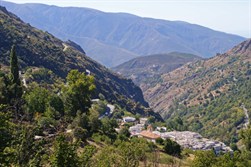The Alpujarras and the difficult stay of the Moriscos
 Once subject to Castilian domain, Jews and Muslims met a different fate. The Jews who refused to convert were expelled in 1492, but those who were formally converted to Christianity, the so-called Conversos, did not have an easy life over the decades and centuries to come. The statutes of Limpieza de Sangre impeded all those who could not demonstrate “pure blood”, and who were not free from any contamination with Jewish blood from occupying public offices and posts. The Muslims, who for centuries lived in Granada and Andalusia, had a different situation. They saw themselves initially granted the right to continue to profess their religion freely, maintaining customs and traditions of their tradition. These peaceful conditions of surrender were, however, soon disregarded by the Castilian political and religious authorities, who imposed a series of mass conversions, otherwise giving the opportunity to the Muslims to emigrate to Northern Africa. This situation, which led to the outbreak of the first revolt of the AlpujarrasThe region of the Alpujarras is a mountainous area in Andalusia, currently corresponding to parts of the provinces of Granada and Almería. In this inaccessible region the moorish population took refuge on two occasions (1499-1500 and 1568-1570), after the fall of the Nasrid kingdom of Granada and rebelled against Christian rule. On both occasions, the revolt was quelled, and after the second rebellion of Granada the Moriscos were removed from their land and scattered throughout the Iberian Peninsula. (photo) in 1499, lasted for several decades during the sixteenth century, remaining stable thanks to the permissiveness through which, despite a formal prohibition, the authorities tolerated the MoriscosThe term Moriscos was used to designate the descendants of the Moors, after the Christian Reconquista, that had formally agreed to repent and abandon Islam. In reality, the morisca population continued to maintain their traditional ways and to practice the Muslim religion in secret. From 1609 until 1614, on the orders of Philip III all the Moriscos, approximately 300,000 people, were expelled from the Iberian Peninsula. who continued to follow the dictates of their religion and Castilian tradition. In 1568, following an order signed by King Philip II, who reaffirmed the obligation of the Moriscos to abandon their traditional ways and fully integrate into Castilian society, the resentment of the people of Muslim origin resurged in the second revolt of the Alpujarras, which was finally subdued only in 1570. After this episode, King Philip II took the decision to divide and scatter the whole community of the Iberian Moriscos, while repopulating the old kingdom of Granada with Christian settlers brought from other regions.
Once subject to Castilian domain, Jews and Muslims met a different fate. The Jews who refused to convert were expelled in 1492, but those who were formally converted to Christianity, the so-called Conversos, did not have an easy life over the decades and centuries to come. The statutes of Limpieza de Sangre impeded all those who could not demonstrate “pure blood”, and who were not free from any contamination with Jewish blood from occupying public offices and posts. The Muslims, who for centuries lived in Granada and Andalusia, had a different situation. They saw themselves initially granted the right to continue to profess their religion freely, maintaining customs and traditions of their tradition. These peaceful conditions of surrender were, however, soon disregarded by the Castilian political and religious authorities, who imposed a series of mass conversions, otherwise giving the opportunity to the Muslims to emigrate to Northern Africa. This situation, which led to the outbreak of the first revolt of the AlpujarrasThe region of the Alpujarras is a mountainous area in Andalusia, currently corresponding to parts of the provinces of Granada and Almería. In this inaccessible region the moorish population took refuge on two occasions (1499-1500 and 1568-1570), after the fall of the Nasrid kingdom of Granada and rebelled against Christian rule. On both occasions, the revolt was quelled, and after the second rebellion of Granada the Moriscos were removed from their land and scattered throughout the Iberian Peninsula. (photo) in 1499, lasted for several decades during the sixteenth century, remaining stable thanks to the permissiveness through which, despite a formal prohibition, the authorities tolerated the MoriscosThe term Moriscos was used to designate the descendants of the Moors, after the Christian Reconquista, that had formally agreed to repent and abandon Islam. In reality, the morisca population continued to maintain their traditional ways and to practice the Muslim religion in secret. From 1609 until 1614, on the orders of Philip III all the Moriscos, approximately 300,000 people, were expelled from the Iberian Peninsula. who continued to follow the dictates of their religion and Castilian tradition. In 1568, following an order signed by King Philip II, who reaffirmed the obligation of the Moriscos to abandon their traditional ways and fully integrate into Castilian society, the resentment of the people of Muslim origin resurged in the second revolt of the Alpujarras, which was finally subdued only in 1570. After this episode, King Philip II took the decision to divide and scatter the whole community of the Iberian Moriscos, while repopulating the old kingdom of Granada with Christian settlers brought from other regions.
